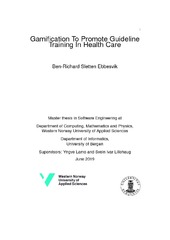Gamification To Promote Guideline Training In Health Care
Master thesis
Permanent lenke
https://hdl.handle.net/1956/20852Utgivelsesdato
2019-06-29Metadata
Vis full innførselSamlinger
Sammendrag
Clinical practice guidelines are recipes for how clinician can identify a specific medical condition in a patient, how to manage and provide treatment for such a patient. These are evidence based statements, which includes recommendations to optimize patient care. Well defined guidelines has shown the effect of improving the quality of health care at a lower cost, as well as reducing practice variability. Despite the positive effects of clinical practice guideline, they have shown a limited effect on changing the clinicians practice methods. Some clinician don't know that such guidelines exists, they are not familiar with the guideline content, they lack the self-confidence to execute the recommended treatment, the previous practice methods make it difficult to adapt to the new recommendations, or the guideline format itself is to cumbersome to read and use. The purpose of this master thesis is to address some of the reasons why the clinical practice guidelines haven't been put more into use. We propose a serious game which will contribute to awareness of the guidelines and training in the guideline content itself. We do present four models. A guideline model, which describes the workflow of the clinical practice guideline. A domain or entity model, which describes the patient, his symptoms, diagnosis and how the clinicians have managed his medical condition. A student learning model which keeps track of the student's performance at different quizzes. A game model which holds information about game elements and the ordering of the game/learning material. By using information from the game model and the student learning model, we can make the game adaptable to the knowledge and progression of the student, as well as flexible such that the student can choose different paths through the learning material.
